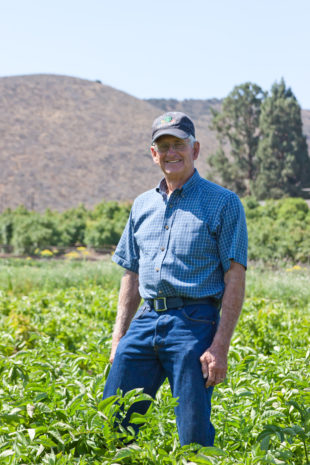Fourth-Generation Farmer Says Labor Shortages have led to Crop Loss
Date: June 28, 2016

A fourth-generation farmer, Craig Underwood has been working and running Underwood Ranches (and Underwood Family Farms) for 45 years. But labor shortages are forcing him to turn to mechanized crops, and he has lost faith that the government will repair the H2-A visa program so farmers like him can rely on adequate field labor.
After 45 years running his family’s Ventura County Farm, Craig Underwood experienced a first: an immigrant labor shortage so severe that he lost crops. With the cost of coming across the border rising rapidly for many migrants—and few skilled domestic workers willing to do the hard picking work—his crews were short dozens of people. “It was the worst year I’ve seen in terms of the labor shortage,” Underwood says, “We literally couldn’t find enough people to get the crops out of the ground.”
Situations like Underwood’s obviously aren’t good for U.S.-born workers in Southern California. With two locations, Underwood Ranches and Underwood Family Farms employ about 160 people year-round, many of them U.S.-born workers who take his crops to farmers markets or help out with school groups coming to pick on the weekends or to community festivals at the farm.
Underwood says he would be much more worried about the future of his farm—and his ability to provide jobs in the community—if he hadn’t made one savvy decision several years ago. While he’s seen many local farmers decide to give up entirely on labor-intensive crops like strawberries, Underwood has been able to fall back on his 2,000 acres of jalapeño peppers, which he now picks almost entirely by a machine designed by his operations manager, Jim Roberts.
“The process started about 10 years ago, but it’s accelerating because a lack of immigration policy is squeezing the labor supply to the point where strictly hand-harvested crops are having trouble getting picked,” says Underwood, a fourth-generation farmer with an agriculture degree from Cornell University.
The process started about 10 years ago, but it’s accelerating because a lack of immigration policy is squeezing the labor supply to the point where strictly hand-harvested crops are having trouble getting picked.
Today, 90-95 percent of Underwood’s pepper crop is machine-harvested. But the farm still needs about 200 workers to run the machines and sort the peppers for the three and a half-month harvest season. Underwood produces all the spicy red jalapeno peppers used by Huy Fong Foods to make its popular Sriracha sauce.
While Underwood hasn’t had trouble acquiring workers yet, he says he could soon. Underwood relies on local labor contractors to provide him with seasonal workers. . But in California, such workers are increasingly in short supply. Between 2002 and 2014, the number of field and crop workers in California decreased by 39.4 percent, a larger drop than anywhere else in the country. “It’s kind of like the drought,” Underwood says, “It hasn’t affected our business directly yet, but it’s just grinding year in and year out, trying to figure out how to deal with it.”
Underwood says the current visa program, which provides temporary visas to farm laborers, is far too inflexible and expensive for a farm like his—especially with its requirements that farmers know what work they’ll need far in advance of the season. “We’ve heard so many horror stories from other farmers about that program,” Underwood says, “We haven’t even pursued it.”
Underwood does not have faith that Congress will fix the program that brings in temporary agriculture workers. So he and Roberts have formulated another plan: They are trying to develop machines capable of picking other crops, such as berries and lemons. And they’ll continue to provide enough work through the winter to keep their workers on hand and available for the harvest season. It’s just not possible to rely on enough new workers coming in anymore.
“One of the arguments for closing our borders and preventing immigrants coming in is that it takes away American jobs,” he says. “Which is baloney; there aren’t people looking for those jobs, certainly not farm jobs.”
